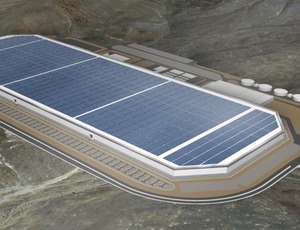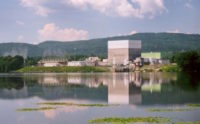
The Sept. 4 revelation that northern Nevada is the site for Tesla Motors' planned $5-billion lithium-ion-battery "gigafactory" sets the stage for what is likely to be a sharp drop in the cost of such batteries over the next few years, as market forces come to bear.
The electric vehicles built by the Palo Alto, Calif.-based Tesla Motors Inc. are powered by batteries composed of thousands of the small, cylindrical, lithium-ion 18650 commodity cells such as those commonly found in computer laptops and cellular phones. They are lighter and cheaper to manufacture than standard cells and cost about $200 per kWh. The gigafactory is expected to cut Tesla's battery costs by 30%, the company says.
"Tesla's scale of production changes the supply production chain, with everything being done on a much bigger scale," says Mark S. Duvall, director of energy utilization for the Electric Power Research Institute, Palo Alto. "[The] gigafactory advances the technology's economies of scale by three to four years."
Tesla, an 11-year-old, 6,000-employee company headed by Elon Musk, last year sold 22,400 electric-powered vehicles and grossed $2 billion in revenue. The new plant is expected to begin cell production by early 2017, with output reaching 35-GWh annually by 2020—enough to supply batteries for 500,000 Tesla vehicles.
Osaka, Japan-based Panasonic Corp., a Tesla investor, currently is the company's sole battery-cell supplier, but it also is investing $1.4 billion in the Nevada plant.
Nevada beat out Texas, New Mexico, California and Arizona in competing for the plant. It won the deal with $1.25-billion in tax incentives over 20 years.
The plant will consist of a two-level, 5-million-sq-ft manufacturing plant and warehouse on a 600-acre site. It is expected to employ 6,500 people and generate 16,000 indirect jobs, for an estimated total economic impact of $100 billion over the next two decades, said Nevada Gov. Brian Sandoval (R) during a press conference announcing the decision. Sandoval called the deal "monumental."
Yates Construction, Philadelphia, Miss., is the general contractor for the concrete tilt-wall building complex. Sitework already is under way. Reno-based subcontractor F&P Construction Inc. began moving 3 million cu yd of dirt in July, employing 250 people and 200 pieces of machinery. Construction is expected to employ 3,000 people and finish by 2016.
Although the facility will rely upon wind and solar power for a net-zero- energy operation, it will consume up to 15,000 tons of lithium carbonate per year in the manufacturing process.
The plant is located 160 miles south of Nevada's only producing lithium-carbonate mine, in Silver Peak. It is owned by Princeton, N.J.-based Rockwood Holdings, which recently performed a capacity expansion there, funded by a $28.4-million federal grant. However, Western Lithium USA Corp., Vancouver, British Columbia, also is spending up to $300 million to develop a mine site in northern Nevada's Humboldt County expected to yield 26,000 tonnes of lithium annually, the company said.
Lithium's value increased tenfold from 2000 to 2010, driven by consumer demand for portable technology. The price has hovered at $6,500 per ton in recent trading, according to Fox-Davies Capital, London.
The gigafactory, which could double in size in the future, is being built inside the 14-year-old, 107,000-acre Tahoe-Reno Industrial Center in Storey County, nine miles east of Reno. The site has rail service and Interstate 80 access, enabling an overnight reach to eight western states. It is 15 miles east of the Reno-Tahoe International Airport.
Nevada has no corporate, franchise, inventory or personal taxes. Tesla (NYSE:TSLA) common stock traded at $282.11 per share on Sept. 8, up 58.8% from a 52-week low of $116.10.
"We're excited about Tesla broadening our economic base and attracting other prospective businesses that could bring additional construction jobs to the area," says John Madole, executive director of the Nevada Associated General Contractors. Plant workers are expected to earn $25 per hour, plus benefits. As part of the incentive package, Tesla will contribute $37 million to kindergarten through 12th-grade public education, plus $1 million for battery research at the University of Nevada, Las Vegas.


Post a comment to this article
Report Abusive Comment